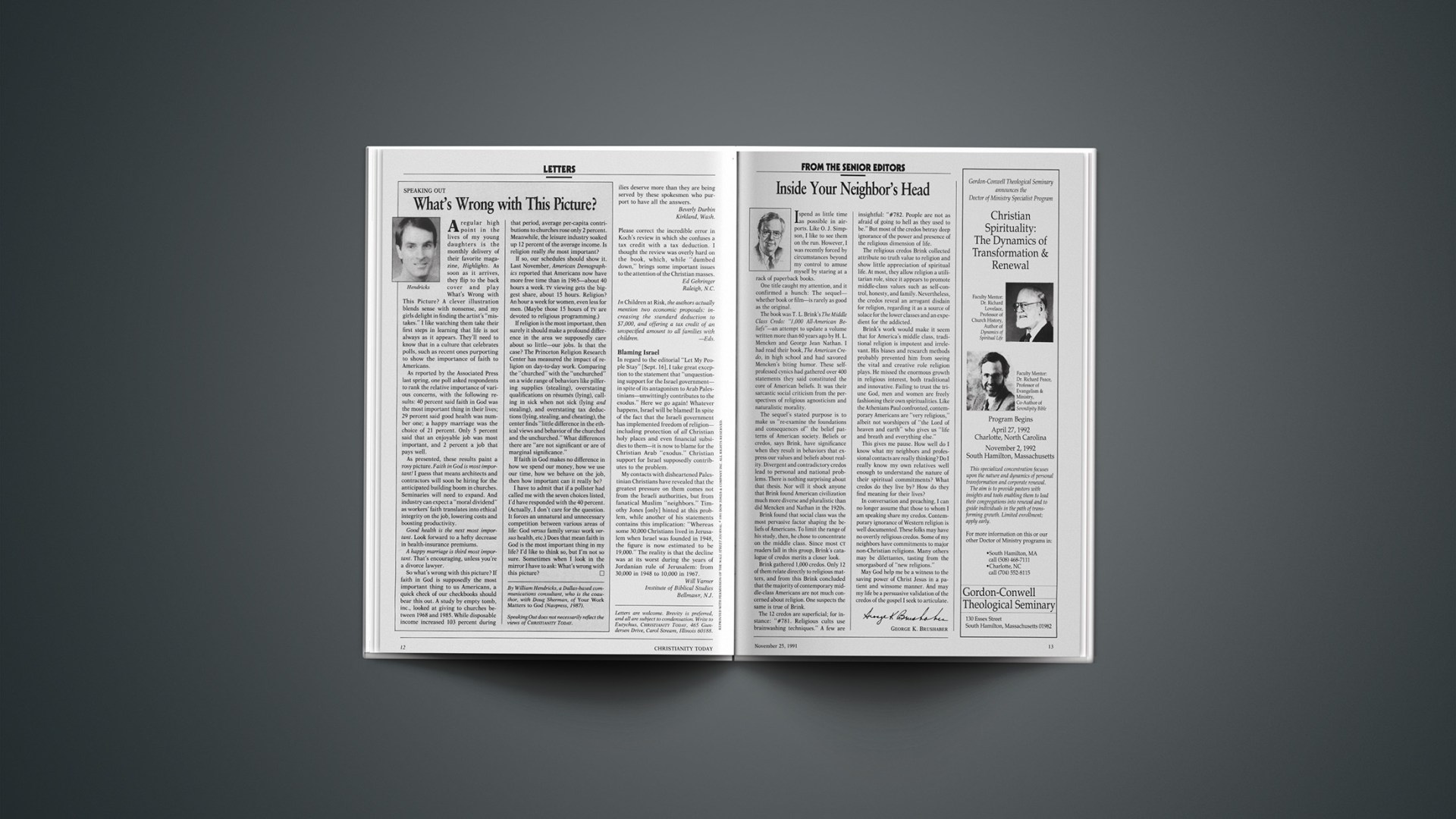A regular high point in the lives of my young daughters is the monthly delivery of their favorite magazine, Highlights. As soon as it arrives, they flip to the back cover and play What’s Wrong with This Picture? A clever illustration blends sense with nonsense, and my girls delight in finding the artist’s “mistakes.” I like watching them take their first steps in learning that life is not always as it appears. They’ll need to know that in a culture that celebrates polls, such as recent ones purporting to show the importance of faith to Americans.
As reported by the Associated Press last spring, one poll asked respondents to rank the relative importance of various concerns, with the following results: 40 percent said faith in God was the most important thing in their lives; 29 percent said good health was number one; a happy marriage was the choice of 21 percent. Only 5 percent said that an enjoyable job was most important, and 2 percent a job that pays well.
As presented, these results paint a rosy picture. Faith in God is most important! I guess that means architects and contractors will soon be hiring for the anticipated building boom in churches. Seminaries will need to expand. And industry can expect a “moral dividend” as workers’ faith translates into ethical integrity on the job, lowering costs and boosting productivity.
Good health is the next most important. Look forward to a hefty decrease in health-insurance premiums.
A happy marriage is third most important. That’s encouraging, unless you’re a divorce lawyer.
So what’s wrong with this picture? If faith in God is supposedly the most important thing to us Americans, a quick check of our checkbooks should bear this out. A study by empty tomb, inc., looked at giving to churches between 1968 and 1985. While disposable income increased 103 percent during that period, average per-capita contributions to churches rose only 2 percent. Meanwhile, the leisure industry soaked up 12 percent of the average income. Is religion really the most important?
If so, our schedules should show it. Last November, American Demographics reported that Americans now have more free time than in 1965—about 40 hours a week. TV viewing gets the biggest share, about 15 hours. Religion? An hour a week for women, even less for men. (Maybe those 15 hours of TV are devoted to religious programming.)
If religion is the most important, then surely it should make a profound difference in the area we supposedly care about so little—our jobs. Is that the case? The Princeton Religion Research Center has measured the impact of religion on day-to-day work. Comparing the “churched” with the “unchurched” on a wide range of behaviors like pilfering supplies (stealing), overstating qualifications on résumés (lying), calling in sick when not sick (lying and stealing), and overstating tax deductions (lying, stealing, and cheating), the center finds “little difference in the ethical views and behavior of the churched and the unchurched.” What differences there are “are not significant or are of marginal significance.”
If faith in God makes no difference in how we spend our money, how we use our time, how we behave on the job, then how important can it really be?
I have to admit that if a pollster had called me with the seven choices listed, I’d have responded with the 40 percent. (Actually, I don’t care for the question. It forces an unnatural and unnecessary competition between various areas of life: God versus family versus work versus health, etc.) Does that mean faith in God is the most important thing in my life? I’d like to think so, but I’m not so sure. Sometimes when I look in the mirror I have to ask: What’s wrong with this picture?
By William Hendricks, a Dallas-based communications consultant, who is the coauthor, with Doug Sherman, of Your Work Matters to God (Navpress, 1987).
Speaking Out does not necessarily reflect the views of CHRISTIANITY TODAY.










